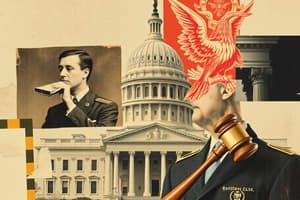Podcast
Questions and Answers
According to Jorge Vedel, what characterizes public authority?
According to Jorge Vedel, what characterizes public authority?
- It is a legal regime defined solely by privileges.
- It is only defined by the common law.
- It is a legal regime characterized by both prerogatives and constraints derived from common law. (correct)
- It applies exclusively to those acting in the financial sector.
What aspect of public administration is deemed important due to institutional interaction and administrative activities?
What aspect of public administration is deemed important due to institutional interaction and administrative activities?
- The financial records of the administration.
- The organic sense of public administration. (correct)
- The political affiliations within the administration.
- The historical precedents of administrative law.
According to Andrés Serra Rojas, what does administrative law aim to achieve?
According to Andrés Serra Rojas, what does administrative law aim to achieve?
- To oversee the educational standards of private institutions.
- To structure the executive power and its operations and relationships, as well as to create specific legal situations. (correct)
- To regulate international trade agreements.
- To manage the financial assets of private citizens.
Which description aligns with Jairo Ramos Acevedo's view of administrative law?
Which description aligns with Jairo Ramos Acevedo's view of administrative law?
Which of the following does the objectivist theory suggest administrative law regulates?
Which of the following does the objectivist theory suggest administrative law regulates?
Which of the following accurately describes what administrative law regulates for the purpose of study?
Which of the following accurately describes what administrative law regulates for the purpose of study?
What constitutes a formal source of law?
What constitutes a formal source of law?
What is considered a material source of law?
What is considered a material source of law?
What are considered historical sources of law?
What are considered historical sources of law?
Which elements comprise the formal sources of administrative law?
Which elements comprise the formal sources of administrative law?
Which elements are considered material sources of law?
Which elements are considered material sources of law?
According to the hierarchy in the provided Kelsen pyramid, what is the status of the Constitution?
According to the hierarchy in the provided Kelsen pyramid, what is the status of the Constitution?
In the normative hierarchy of administrative law, what order do acts of other national entities hold?
In the normative hierarchy of administrative law, what order do acts of other national entities hold?
What is the role of the Constitution in administrative law?
What is the role of the Constitution in administrative law?
How is 'Law' understood as a source of administrative law?
How is 'Law' understood as a source of administrative law?
What characterizes statutory laws as a source of administrative law?
What characterizes statutory laws as a source of administrative law?
In what manner can the President of the Republic issue laws during periods of crisis?
In what manner can the President of the Republic issue laws during periods of crisis?
What is the purpose of a regulatory decree?
What is the purpose of a regulatory decree?
What are examples of administrative acts issued from the President of the Republic?
What are examples of administrative acts issued from the President of the Republic?
What administrative acts do ministers and directors of administrative departments typically issue?
What administrative acts do ministers and directors of administrative departments typically issue?
Which entities are part of the central sector that issue administrative acts?
Which entities are part of the central sector that issue administrative acts?
Which best describes the bodies in the decentralized sector?
Which best describes the bodies in the decentralized sector?
According to Article 305 of the Constitution, who holds the power to issue regulations at the departmental level?
According to Article 305 of the Constitution, who holds the power to issue regulations at the departmental level?
According to Article 315 of the Constitution, who is authorized to regulate municipal agreements?
According to Article 315 of the Constitution, who is authorized to regulate municipal agreements?
Which principle ensures fair allocation of resources, access to opportunities, and equitable treatment under the law?
Which principle ensures fair allocation of resources, access to opportunities, and equitable treatment under the law?
What principle dictates that public resources are used in accordance with the law?
What principle dictates that public resources are used in accordance with the law?
Considering the formal sources of administrative law, which option reflects the correct understanding of 'Ley'?
Considering the formal sources of administrative law, which option reflects the correct understanding of 'Ley'?
How does the principle of prevalence of general interest impact administrative actions?
How does the principle of prevalence of general interest impact administrative actions?
What influence do general principles of law have as sources of administrative law?
What influence do general principles of law have as sources of administrative law?
In the context of material sources, what role does legal doctrine play in shaping administrative law?
In the context of material sources, what role does legal doctrine play in shaping administrative law?
Which statement properly articulates the scope of regulatory authority granted to a governor under Article 305?
Which statement properly articulates the scope of regulatory authority granted to a governor under Article 305?
What implications arise from the principle affirming everyone's entitlement to efficient public services?
What implications arise from the principle affirming everyone's entitlement to efficient public services?
Which element is vital when judging an action's alignment with the principle of due process inside administrative contexts?
Which element is vital when judging an action's alignment with the principle of due process inside administrative contexts?
Considering legal interpretation, how does the principle of hierarchical normativity mold the structure of law?
Considering legal interpretation, how does the principle of hierarchical normativity mold the structure of law?
In what manner do historical legal sources factor into contemporary administrative law?
In what manner do historical legal sources factor into contemporary administrative law?
How might the principle promoting ethnic and cultural diversity shape administrative decisions?
How might the principle promoting ethnic and cultural diversity shape administrative decisions?
Where will you typically find the key elements of public administration?
Where will you typically find the key elements of public administration?
Flashcards
¿Qué es el Derecho Administrativo?
¿Qué es el Derecho Administrativo?
Law governing the organization and activities of public administration.
¿Qué regulaciones establece el Derecho Administrativo?
¿Qué regulaciones establece el Derecho Administrativo?
Regulations for organizing central, sectional administration, and public services.
Vidal Perdomo: ¿Cómo se vincula el Derecho Administrativo?
Vidal Perdomo: ¿Cómo se vincula el Derecho Administrativo?
Study of administration's structure impacts understanding of administrative law.
Andrés Serra Rojas: ¿Cómo define el Derecho Administrativo?
Andrés Serra Rojas: ¿Cómo define el Derecho Administrativo?
Signup and view all the flashcards
¿Qué regula el derecho administrativo?
¿Qué regula el derecho administrativo?
Signup and view all the flashcards
Jairo Ramos Acevedo: ¿Cómo define el Derecho Administrativo?
Jairo Ramos Acevedo: ¿Cómo define el Derecho Administrativo?
Signup and view all the flashcards
¿Con quienes regula relaciones el Derecho Administrativo?
¿Con quienes regula relaciones el Derecho Administrativo?
Signup and view all the flashcards
¿Qué es una Fuente Formal?
¿Qué es una Fuente Formal?
Signup and view all the flashcards
¿Qué son las Fuentes Materiales?
¿Qué son las Fuentes Materiales?
Signup and view all the flashcards
¿Qué comprenden las fuentes históricas del derecho?
¿Qué comprenden las fuentes históricas del derecho?
Signup and view all the flashcards
¿Cómo se defined Derecho Constitucional?
¿Cómo se defined Derecho Constitucional?
Signup and view all the flashcards
¿Qué abarca la ley en el Derecho Administrativo?
¿Qué abarca la ley en el Derecho Administrativo?
Signup and view all the flashcards
¿Que es EL DECRETO REGLAMENTARIO?
¿Que es EL DECRETO REGLAMENTARIO?
Signup and view all the flashcards
¿Qué introduce el Potestad Reglamentaria?
¿Qué introduce el Potestad Reglamentaria?
Signup and view all the flashcards
¿Qué Principios rigen el Derecho Administrativo?
¿Qué Principios rigen el Derecho Administrativo?
Signup and view all the flashcards
Study Notes
Administrative Law
- Administrative Law is the common law of public authority according to Jorge Vedel
- Public authority is a legal system characterized by prerogatives and constraints beyond common law
- These are recognized or imposed on those acting in national sovereignty.
- Administrative Law pertains to the legal power exercised by the executive branch.
Definition of Administrative Law
- Administrative Law consists of rules governing central, sectional administration, and public services.
- Mario Rodríguez defines it descriptively as rules and principles shaping public administration's organization, functions, processes, actions, and accountability.
- Vidal Perdomo notes the link to administration, making the study of its structure and activity central.
- It emphasizes the importance of the organic sense of public administration, facilitating interactions and administrative activities through institutions.
- Andrés Serra Rojas (Mexican professor) defines Administrative Law as rules structuring executive power, its operation, and relations with individuals and entities.
- Administrative Law, from a material perspective, is a domestic law branch executing concrete, subjective actions creating particular situations.
- This professor concludes that it is a branch of domestic law with structures, doctrinal principles, and rules governing direct and indirect public administration activities.
- This includes executive power, organization, management, oversight, public affairs, relations, services, and state actions.
- Jairo Ramos Acevedo sees Administrative Law as a scientific discipline and a branch of law
- It studies principles and norms for public administration, with subjective/organic and objective aspects.
- Administrative Law is the branch studying principles and norms governing public administration's organization, activities, means, and relationships.
- Libardo Rodríguez R defines Administrative Law as the law of Administration.
- Gabriel Rojas Arbeláez defines it as domestic law governing the organization and activity of public administration under the rule of law.
- Orlando García Herreros states that studying the structure and activity of public administration is part of Administrative Law's subject matter
- It encompasses the legal regime and the administrative function it fulfills.
- From an objectivist perspective, Administrative Law regulates:
- Structure and organization of power for administrative functions
- Assets and finances needed for public administration stability and performance regularity
- Exercise of activities that the power must perform under the administrative form
- Status of citizens in relation to the administration
- For class purposes, Administrative Law is the branch regulating legal and factual relations between the State and those it governs
- This also includes relations between the State and itself, and with mixed-nature entities.
Sources of Administrative Law
- In legal terminology, the word 'law' demands careful distinction
- Formal Sources
- Real or material sources
- Historical sources
Formal Source
- Formal source refers to the creation processes of legal norms, or imperative societal norms from authority sufficient to govern human conduct.
Material Sources
- Material sources in law include all factors causing the creation and determining the content of legal norms, not from social evolution.
- They stem from multiple causes shaping them.
Historical Source
- Historical sources are documents (inscriptions, papyri, books) containing a law or laws
- They are historical documents referencing Law, such as the Digest, Code, and Novels as sources of Roman law.
- Formal Sources include: Law, Custom, Jurisprudence
- Material Sources include: General principles of law, Comparative Law, Doctrine
Hierarchy of Legal Sources
- Constitution
- Treaties and International Agreements
- Law
- Decrees with the force of Law
- Regulations
- Jurisprudence
- Doctrine
- General Principles of Law
National Constitution
- Constitutional law is defined as the set of rules relating to the fundamental structure of the State, the functions of its bodies and the relations of these with each other and with individuals.
- The constitution is the fundamental norm that establishes the State's organic operation, which is the primary source of administrative law
- Its normative composition and jurisprudence must conform to the superior text.
The Law
- The Law is understood as that enacted by Congress (formal sense) and all decrees with the force of law.
- Law is a source of Administrative Law because the concept of administration, as regulated, is correlative to the rule of law.
- The administration acts according to Articles 3, 6, and 121 of the CN, respecting the Constitution and the Law.
- In the strict sense, it is enacted by the Congress of the Republic.
- Statutory laws (Art. 152, CN)
- Organic laws (Art. 151, CN)
- Framework or Picture laws (Art. 150, num 19, CN)
- Ordinary laws (Art. 150, CN)
Presidential Decrees
- Issued by the President of the Republic in an improper sense.
- In times of crisis:
- Legislative decrees in a state of foreign war (Arts. 212 & 214 CN)
- Legislative decrees in a state of internal commotion (Arts. 213 & 214 CN)
- Legislative decrees in a state of economic, social, and ecological emergency (Art. 215 CN)
- In normal periods, these include:
- Presidential Decrees with material force of Law.
- Decree laws or Extraordinary Decrees (Art. 150, num 10°, CN).
- Planning or Planning Decrees (Art. 341 CN).
Regulatory Decree
- The regulatory decree is the norm that aims to give viability to the law, facilitating its application.
- The Regulations Power is the administrative power in the head of the executive, to comply with and enforce the Laws, according to Art. 189, numeral 10 and 11 of the Higher Charter.
- The regulatory power finds its limitation in the material content of the Law because it cannot interpret it, as it depends directly on the judges and is of a subsidiary nature.
- The regulations can only introduce forms (circumstances of time, manner, and place) for proper compliance with the Law and can not generate new rules.
- For example, in the case of taxes, the law indicates the amount, and the regulatory decree indicates the circumstances of form.
Administrative acts of the President of the Republic.
- Constitutional, autonomous or executive decrees of the Constitution.
- Regulatory or executive decrees of the Law.
- Framework or in-frame decrees.
- Amendment or correction decrees of calligraphic or topographical errors.
- Ordinary decrees.
- Resolutions of the President of the Republic.
- Executive resolutions.
- Regulatory resolutions.
- Ordinary Resolutions.
- Other ordinary acts of the President of the Republic.
- Circulars, Instructions and Circulars.
Other National Authorities
- Action is taken by authorities other than the President of the Republic, as per the hierarchy of:
Sector central. All issue Resolutions:
- Ministers and directors of administrative departments.
- Vice ministers and subdirectors of administrative departments
- Heads of ministerial units
- Superintendents and directors of special administrative units.
- Within this same level (Central Sector) are the bodies of the other branches of public power, control bodies and atypical or special state entities
- Presidents of the Senate of the Republic
- President of the Chamber of Representatives.
- President of the Administrative Chamber of the Superior Council of the Judiciary
- President of the Constitutional Court
- President of the Supreme Court of Justice
- President of the Council of State
- President of the National Electoral Council
- Attorney General of the Nation
- National Registrar of Civil Status
- Comptroller General of the Republic
- Attorney General of the Nation
- Ombudsman.
- Also acts from:
- Administrative bodies of the Bank of the Republic.
- Autonomous Regional Corporations.
- National autonomous universities
- National Civil Service Commission
- National Television Authority.
Decentralized sector by services
- There will be a collegiate body (Board or Governing Council) that issues Agreements and Resolutions.
- A legal representative who issues Resolutions.
Regulatory Powers at Departmental Level
- According to Art. 305 #1 CN, it corresponds to the Governor to "Comply with and enforce the CN, the laws, the decrees of the Government and the ordinances of the departmental assemblies."
- Decree 1222/86 Art. 95 #19 authorizes him to "Issue regulations and dictate orders for the proper functioning of administrative offices."
Municipal Level regulatory powers
- According to Art. 315 #1 CN, it corresponds as an attribution of the Mayor to "Comply with and enforce the CN, the laws, the decrees of the Government, the ordinances and the agreements of the council."
- Law 49/87 Art. 5 #2 authorizes him to "Regulate municipal agreements," a provision repeated by Law 136/94 Art. 91 Numeral 6, Literal A.
Principles Governing Administrative Law
- The principle of national unity.
- The principle of decentralization.
- The principle of autonomy of territorial entities.
- The principle of participation.
- The principle of prevalence of the general interest.
- The principle of the normative hierarchy.
- The principle of legality.
- The principle of ethnic and cultural diversity of the nation.
- The principle of human dignity.
- The principle of equality.
- The principle of due process.
- The principle of protection of fundamental rights and freedoms.
- The principle of respect for acquired rights.
- The principle of protection of public property.
- The principle of the responsibility of the State and its servants.
- The principle of separation of powers.
- The principle of administrative career.
- The principles of the administrative function.
- The principle of control of administrative activity.
- The principle of economic freedom.
- The principle of State intervention in the economy.
- The planning principle.
- The principle of legality of public expenditure.
- The principle of universal access to the efficient provision of public services.
Studying That Suits You
Use AI to generate personalized quizzes and flashcards to suit your learning preferences.




